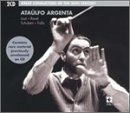| All Artists: Franz Liszt, Maurice Ravel, Franz [Vienna] Schubert, Manuel de Falla, Ataulfo Argenta, Ana Maria Iriarte, Paris Conservatory Concert Society Orchestra, Cento Soli Orchestra Title: Great Conductors of the 20th Century: Ataúlfo Argenta Members Wishing: 0 Total Copies: 0 Label: EMI Classics Release Date: 6/4/2002 Album Type: Original recording remastered Genre: Classical Styles: Ballets & Dances, Ballets, Historical Periods, Modern, 20th, & 21st Century, Symphonies Number of Discs: 2 SwapaCD Credits: 2 UPC: 724357509725 |
Search - Franz Liszt, Maurice Ravel, Franz [Vienna] Schubert :: Great Conductors of the 20th Century: Ataúlfo Argenta
 | Franz Liszt, Maurice Ravel, Franz [Vienna] Schubert Great Conductors of the 20th Century: Ataúlfo Argenta Genre: Classical
|
Larger Image |
CD Details |
CD ReviewsUN MAESTRO M. Ferrer | SPAIN | 06/09/2004 (4 out of 5 stars) "Ataulfo Argenta is probably one the best directors ever been in Spain. Unfortunately he is not well known abroad. This is , maybe, due to the time he lived. Spain was under the dictatorship of Franco.For a whole generation Argenta shown and introduced the great Spanish composers through his emision in the national radio broadcast. Personally I think that Falla has been always his "piéce de resistance", and this recording is a real proof of it.I find the selection in this cd very interesting and with the bonus of Ana María Iriarte, an elegant singer. My personal favourite is the second cd. El Amor Brujo is a wonderful masterwork. And I think is here where Argenta reveals his great quality. The orchestrations of this work are perfectly reflected in the recording. Although I miss the orquesta Nacional de España the one chosen here is a good one. Its sound is very from the fifties, but is charming anyway. Maybe a little more of eenergy would have been requested." An exceptional "Faust" and a superb "Great" L. Johan Modée | Earth | 03/20/2007 (5 out of 5 stars) "Apart from boasting an outstanding interpretation of de Falla's El Amor Brujo (mono recording) - probably the best ever - this twofer collects two outstanding gems from Ataúlfo Argenta's recording legacy: his 1955 recording of Liszt's "A Faust Symphony" and the his 1957 Schubert Symphony no. 9 ("The Great").
The Faust symphony, an early stereo recording, is here presented in its 1854 original version - that is, the choral ending of the Mephistopheles Finale is omitted. Liszt added that ending in 1857. (It has always appeared to me as a great anticlimax after that great finale.) Argenta's superb reading is furiously powerful, flexible though carefully molded, underscoring the dark melodic lines. The 1957 Schubert is also excellent. Again, as in the Liszt recording, Argenta's flexible reading accentuates the romantic aspects of the work, while the rhythm remains firmly in his control. Perhaps it is not one of the greatest "Great" on record (consider Abendroth, Furtwängler, Munch and Szell for reference), but it's surely one of the most thrilling. The stereo recording is good but vintage. Warmly recommended. " |

 Track Listings (4) - Disc #1
Track Listings (4) - Disc #1